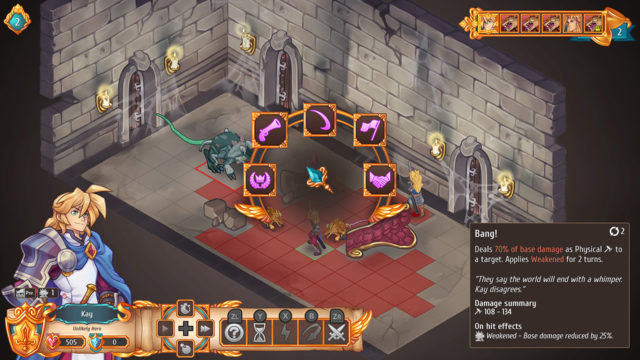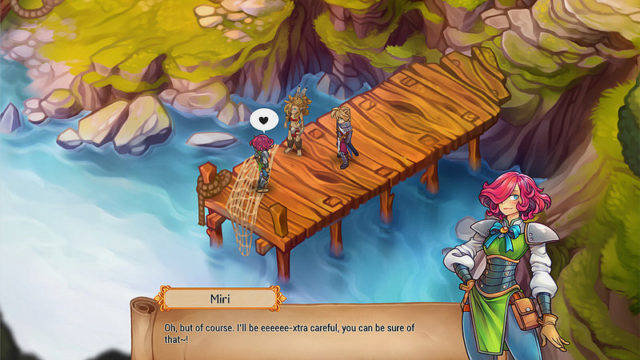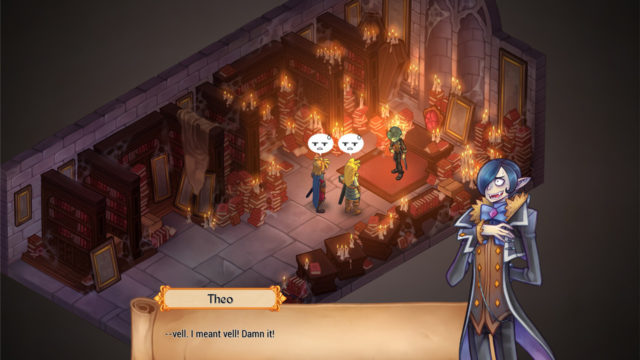Great art design; some clever comedic moments; deep strategy and RPG elements
Bad load times all over the place; some of the comedy falls flat; combat system could be better
It’s always good to see indie games make their way to Switch. It’s especially cool to see a game that started its life as a Kickstarter project become a Switch game. In many ways, Regalia: Of Men and Monarchs – Royal Edition is much of what you’d hope for in such a game, delivering the deep experience the developers claimed they could make. Unfortunately, problems in both design and programming keep this from being the game it could have been.
Regalia, a multiplatform title available for $24.99 on Switch, is a tactical role playing game in the vein of Fire Emblem or Disgaea, combined with strategy and NPC social bonding elements. The “Royal Edition” includes the core came as well as the DLC from the Steam version. The player takes on the role of Kay, a suspiciously named noble who comes into the inheritance of a destitute kingdom and a load of debt. It’s the job of Kay and his family to rebuild the kingdom and stave off debt villains and debt collectors alike.
From the outset, the game positions itself as anything but serious. It’s a distinctly American comedy, with humor that sometimes hits well and sometimes whiffs badly. It’s also a T-rated comedy, with some language and innuendo, so don’t let the cartoonish characters fool you. Characters, appropriately, are a bit over-the-top in their personalities and intentions, and are drawn in a way that does them justice. Production values are above average. The game looks good, with some nifty art design, especially at the character level. The music is passable, if not particularly memorable. The same could be said for the voice acting, which isn’t Oscar-worthy but isn’t a phone-in job either, and the dialogue, when it hits, is acted in a way that makes it hit pretty well.

The gameplay is very deep, and early on it can be hard to digest, especially since what the game calls a tutorial is pretty basic. Most players will probably find themselves wading through the large menu and forging trial-and-error style through the combat before they finally start to grasp how everything works.
Regalia doesn’t make it easy early on, either. The default combat difficulty is pretty hard, and the early game puts rather serious deadlines on meeting in-game objectives. Each social bonding action or construction project consumes an in-game day, while expeditions consume several days. Nevertheless, the game requires the completion of a number of quests- such as completing multiple projects or finishing an expedition— before a given date or face game over. It’s not hard to see how a novice player could find themselves in a no-win situation after several hours of gameplay… and, depending on their save files, forced to restart entirely.
Combat is okay, if not special. To its credit, Pixelated Milk draws from some best practices in tactical RPGs, and veterans of the genre will see some familiar trappings, like initiative bars and movement grids. On the other hand, some of the wrinkles work better than others; the way the game uses line of sight, for example, is annoying due in large part to the way the landscapes appear visually on screen. There are some ways to work around this, but they’re not intuitive compared to other tactical RPGs.

A good chunk of the game’s several hours of gameplay are liable to be load screens. It takes a good minute for the game to boot up at the start, and 10-20 seconds to load each location. This is especially maddening when trying to go just from the castle basement to upstairs, only to be faced with yet another load wait. It sucks a lot of the fun and flow out of the game, and is hard to justify given just how relatively small the in-game environments are.
Another problem is selecting people and actions on the town map. Facing an option with the main character is no guarantee that the option will be chosen, and for a time this reviewer wasn’t sure he’d even be able to access the expeditions because the associated icon wouldn’t target. Some online research revealed the workaround to use the ZR and ZL buttons to cycle through available actions, but these are the sorts of headaches that add up with Regalia.
To their credit, both of the above problems were discussed in an e-mail sent out from the developer to review sites post-release, with a statement that a patch is on the way for the second problem and the developer is looking into what can be done about the first. At the time of this review, though, those issues still exist and there is no clear timetable, in particular, to how the developer will deal with the loading problem. The developer also suggested playing the game on internal memory to deal with the load times, but the load times discussed above for this review reflect gameplay through internal memory.

Overall, Regalia is a deep game with a lot to do, but it’s also a game that is hard, especially as players learn the ropes early on. It’s also a game with some design issues that lessen the experience, and between those and the long, frequent load times, it’s a game that can wear out its welcome. Those are things to keep in mind before foraging into this adventure.
Nintendojo was provided a copy of this game for review by a third party, though that does not affect our recommendation. For every review, Nintendojo uses a standard criteria.




 ShareThis
ShareThis





